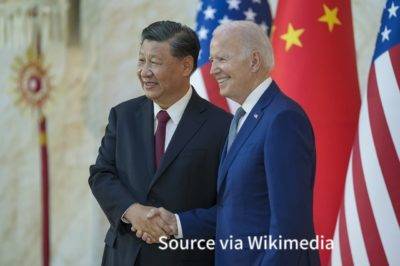US Treasury Secretary Janet Yellen’s forthcoming visit to Guangzhou and Beijing signals a strategic stance against China’s alleged inundation of global markets with inexpensive green technology. Janet Yellen, set to engage in pivotal discussions with high-ranking Chinese officials, including the finance minister, vice-premier, and central bank governor, has not shied away from hinting at the possibility of implementing trade barriers to shield American green tech manufacturers from Chinese competition. The trip is part of a broader effort to reinvigorate diplomatic ties between the two economic powerhouses, marked by recent exchanges at the presidential level, including a phone conversation between President Joe Biden and Chinese President Xi Jinping.
Janet Yellen’s stance reflects growing concerns over China’s perceived overproduction of green tech components like batteries and solar panels, potentially undercutting American counterparts. However, Beijing is anticipated to rebut such claims, dismissing them as a pretext for protectionist measures aimed at disrupting China’s economic progress. The Chinese government contends that the US is leveraging concerns over oversupply to justify policies aimed at decoupling the intertwined economies.
Economic Implications and Disputes between US and China Fallout Janet Yellen stance
The intensifying economic rift between the US and China hinges on divergent perceptions regarding trade practices and their implications. Economists and foreign observers have raised alarms over China’s state-sponsored support for green tech industries, coupled with sluggish consumer demand and economic downturn, culminating in a surplus that depresses prices and hinders foreign competition. Notably, Chinese officials acknowledge an imbalance between production and domestic demand, with excess capacity rendering factories dormant—a phenomenon exacerbating global oversupply dynamics.
Despite acknowledgment of overcapacity, Chinese authorities maintain that subdued global demand, rather than excessive production, poses the primary challenge. This narrative underscores Beijing’s contention that surplus goods serve as a buffer against inflationary pressures and support international trade. Additionally, China is poised to challenge US policies on national security, citing concerns over attempts by Congress to mandate the sale of Chinese-owned social media platform TikTok. Such disputes underscore the multifaceted nature of the US-China economic relationship, characterized by intertwined interests and competing narratives.
Geopolitical Implications and Narratives
Beyond economic dimensions, the US-China trade dispute assumes geopolitical significance, with broader implications for global power dynamics. China portrays its export initiatives as beneficial to both developing nations and the global economy, framing Western apprehensions as attempts to thwart China’s ascent in advanced manufacturing sectors. This narrative, propagated by Chinese state media, challenges Western perceptions of China’s economic rise and underscores the complexity of bilateral relations.
As Janet Yellen prepares to engage in critical discussions with Chinese counterparts, the outcome of these deliberations will reverberate beyond economic realms, shaping geopolitical narratives and strategic alliances. The intersection of economic competition, technological innovation, and geopolitical maneuvering underscores the intricacies of the US-China relationship and the challenges inherent in navigating a complex global landscape.
Bilateral Talks and Regional Stability between US and China’s leaders
The discussions between Xi and Biden extended beyond bilateral issues to encompass regional stability, touching upon crises in Ukraine and the Korean Peninsula. Both leaders reaffirmed the importance of open communication channels and pledged to implement the “vision of San Francisco,” promoting consultation mechanisms across various domains, including military, diplomatic, and economic spheres. Despite underlying tensions, Biden reiterated Washington’s stance against instigating a new Cold War or seeking to alter China’s political system. The affirmation of the “one China policy” and the rejection of economic relationship ruptures signal a commitment to diplomatic engagement and economic stability.
Looking ahead, both nations agreed to future visits by high-level officials, including Janet Yellen and Secretary of State Antony Blinken, with the aim of fostering dialogue, mitigating misunderstandings, and advancing cooperation. The proposed exchanges underscore a shared recognition of the imperative to navigate challenges collaboratively while seeking mutually beneficial outcomes. However, as trade barriers loom and geopolitical tensions persist, the path towards a stable and sustainable US-China relationship remains fraught with complexities, necessitating continued diplomatic efforts and strategic dialogue.
Table of Contents
Discover more from OGM News NG
Subscribe to get the latest posts sent to your email.














